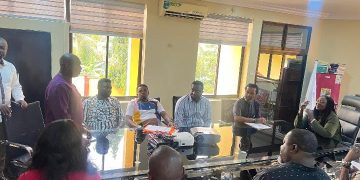By Okonkwo Goodluck
The Niger Delta Development Commission has commissioned a solar-powered borehole at the University of Calabar, a project aimed at improving water supply and promoting student welfare in the Niger Delta region.
The project, facilitated by Senator Asuquo Ekpenyong, who represents Cross River South, is part of ongoing efforts to enhance critical infrastructure in educational institutions.
The commissioning ceremony, held on the university campus on Monday, was attended by a high-level delegation from the NDDC, university management, student leaders, and members of the host community. The project is expected to resolve long-standing water scarcity challenges, especially in densely populated student residential areas.
Located in Halls 6, 7, 9, 11, and 12, as well as the Scholarship Hostel, the solar-powered borehole is designed to provide a steady, eco-friendly water supply.
During a guided inspection of the facility, Edetedet Essien, Head of Project Monitoring at NDDC, emphasized that the project is part of a broader initiative to enhance infrastructure in educational institutions across the Niger Delta. He highlighted the use of solar technology as a sustainable and reliable solution to meet the water needs of the university community.
Also speaking during the event, Vice Chancellor Prof. Florence Obi received official documentation for the project and expressed profound gratitude to the NDDC and Senator Ekpenyong. She described the initiative as “a timely and transformative gesture” aligned with the university’s commitment to sustainable development.
“This initiative addresses a fundamental need—access to clean water,” Prof. Obi stated. “It will ease pressure on our existing systems, improve the daily lives of students and staff, and set a precedent for future partnerships aimed at enhancing our learning environment.”
Student Union Government President, Blessing Alims, also commended the NDDC for its responsiveness to student needs.
“This is not just a water project,” she said. “It is a demonstration of what can be achieved when government agencies respond to real issues with real solutions. It shows a strong commitment to student welfare and to building a truly sustainable university community.”
Alims further called for continued collaboration between the university and the NDDC, emphasizing that investing in education is key to regional peace and development.
























